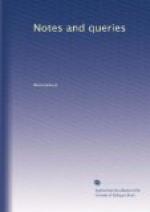BRANBRIDGES.
York Buildings Company.—This company existed about the middle of the last century. I shall be glad to be informed where the papers connected with it are to be met with, and may be referred to.
WDN.
Saying ascribed to Montaigne.—The saying, “I have here only made a nosegay of culled flowers, and have brought nothing of my own but the thread that ties them,” is usually ascribed to Montaigne. In what part of his works are these words to be found? I heard doubts expressed of their genuineness some years ago by a reader of the Essays; and my own search for them has also proved hitherto unsuccessful.
C. FORBES. {279}
“Modum promissionis.”—Will any of your readers help to interpret the following expression in a mediaeval author:—
“(Ut vulgo loquitur) modum promissionis ostendit?”
I have reason to think that modum promissionis means “a provisional arrangement:” but by whom, and in what common parlance, was this expression used?
C.W.B.
Roman Catholic Theology.—Is there any work containing a list of Roman Catholic theological works published in the English language from the year 1558 to 1700?
M.Y.A.H.
Wife of Edward the Outlaw.—Can any of your correspondents inform me who was the wife of Edward the Outlaw, and consequently mother of Margaret of Scotland, and ancestress of the kings of England?
The account adopted by most historians is that Canute, in 1017, sent the two sons of Edmund Ironside to the king of Denmark, whence they were transferred to Solomon, king of Hungary, who gave his sister to the eldest; and, on his death without issue, married the second Edward to Agatha, daughter of the Emperor Henry II. (or, in some accounts, Henry III., or even, in Grafton’s Chronicles, called Henry IV.), and sister to his own queen.
That Edward the Outlaw returned to England in 1057, having had five children, of whom three survived: Edgar; Margaret, who in 1067 married King Malcolm of Scotland, and another daughter.
Now this account is manifestly incorrect. The Emperor Henry II. died childless: when on his death-bed he restored his wife to her parents, declaring that both he and she had kept their vows of chastity.
Solomon did not ascend the throne of Hungary until 1063, in which year he had also married Sophia, daughter of the Emperor Henry III.; but this monarch (who was born in October, 1017, married his first wife in 1036, who died, leaving one child, in 1038 and his second wife in November 1043) could not be the grandfather of the five children of Edward the Outlaw, born prior to 1057.
The Saxon Chronicle says, that Edward married Agatha the emperor’s cousin.
E.H.Y.




